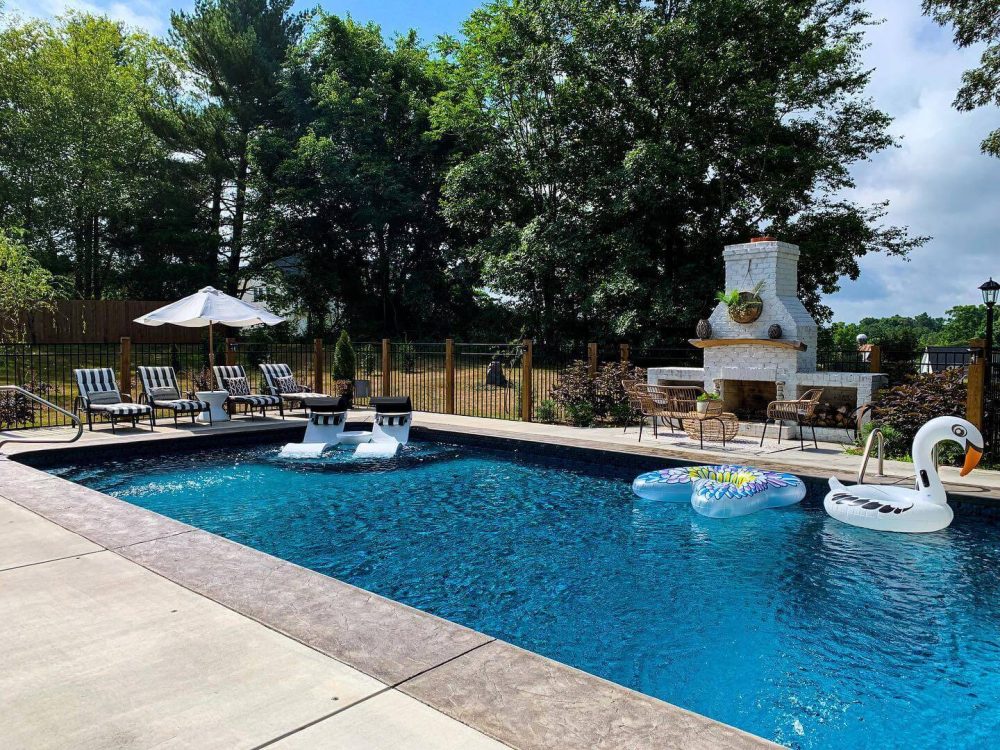Heated saltwater pool are an alternative to extending your swimming season when it leaves sooner than you would like. And you have the opportunity to get a little more time in the pool every year.
Saltwater pools are an alternative to traditional chlorine pools. Brine contains a smaller amount of chlorine, generated through the filter system.
The water sanitation system in the saltwater pool uses a saltwater chlorinator. So even though it contains chlorine, you no longer need to use chlorine tablets.
Heated saltwater pool are great if you live outside a warm southern state like Texas, California, or Florida. You might consider investing in a pool heater to extend your swimming season.
And now, saltwater pools are becoming more common in hotels, resorts, and on cruise ships. You can even choose to install a saltwater pool in your own home.
Saltwater Pool vs Chlorinated Pool
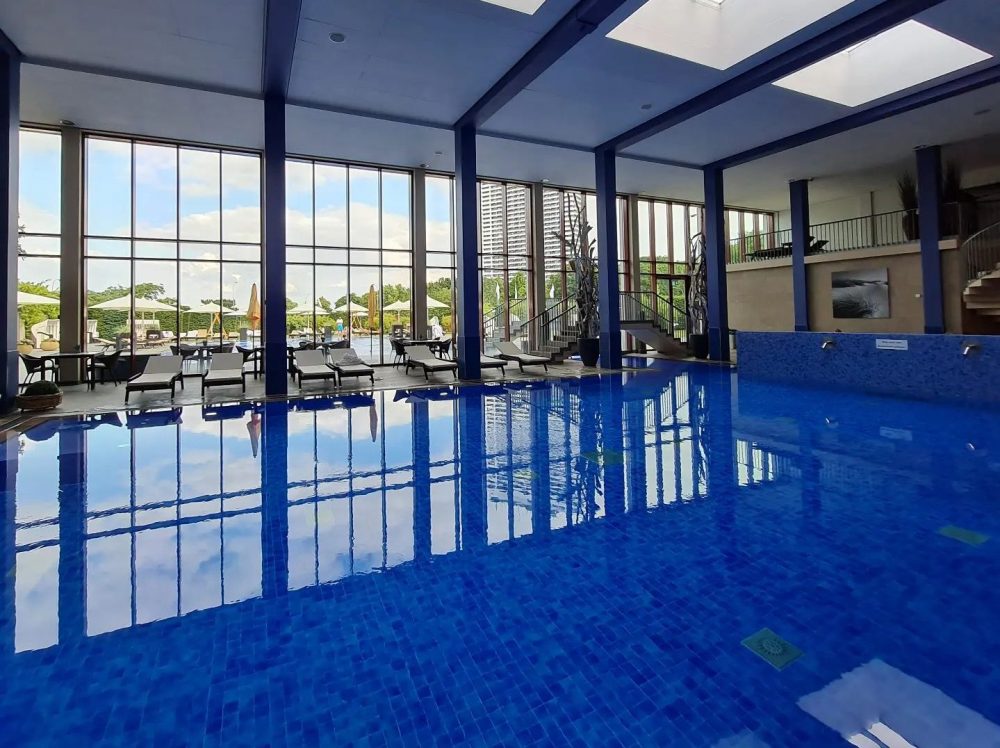
Saltwater and chlorine pools are two of the most popular pool systems on the market. These two types of pools have relatively different cleaning systems from each other.
Saltwater pools require relatively less maintenance, as they have a cleaning system with a filter called a salt chlorine generator. However, this system requires electricity to run a salt chlorine generator which converts salt into chlorine.
Chlorinated pools have a relatively lower initial cost, without the need for electricity. But on the other hand, regularly added chlorine tablets or granules may have a negative effect on your skin and hair.
Both types of pools above both require regular checks of the pH and alkalinity levels of the pool. It aims to keep the pool water clean and the chemicals in balance.
So which one is better between the two? Of course you have to adapt it to your personal situation. You have to weigh the advantages, disadvantages and potential health risks between the two.
Saltwater Pool
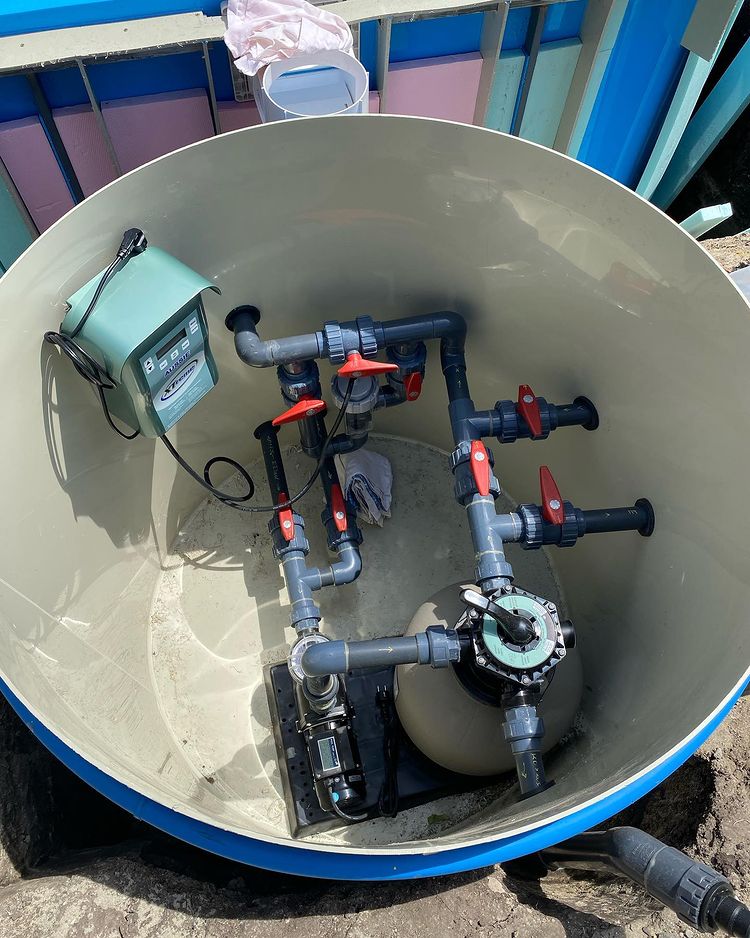
If you think that saltwater pools are free of chlorine, then you are completely wrong. Because your pool filtration system is equipped with a chlorine generator that converts salt into chlorine.
Then the chlorine will be sent back to the pool to clean the water. The fact is that it contains much less chlorine than you would have with a traditional chlorine system.
The much lower chlorine level makes the water gentler on your skin, eyes and hair. This may sound more appealing to avid swimmers or parents who want to avoid children’s exposure to chlorine.
For some people with asthma, an indoor saltwater pool is often an option. Because the chlorine content is very low, it doesn’t have a chlorine smell that bothers them.
Chlorine Pool
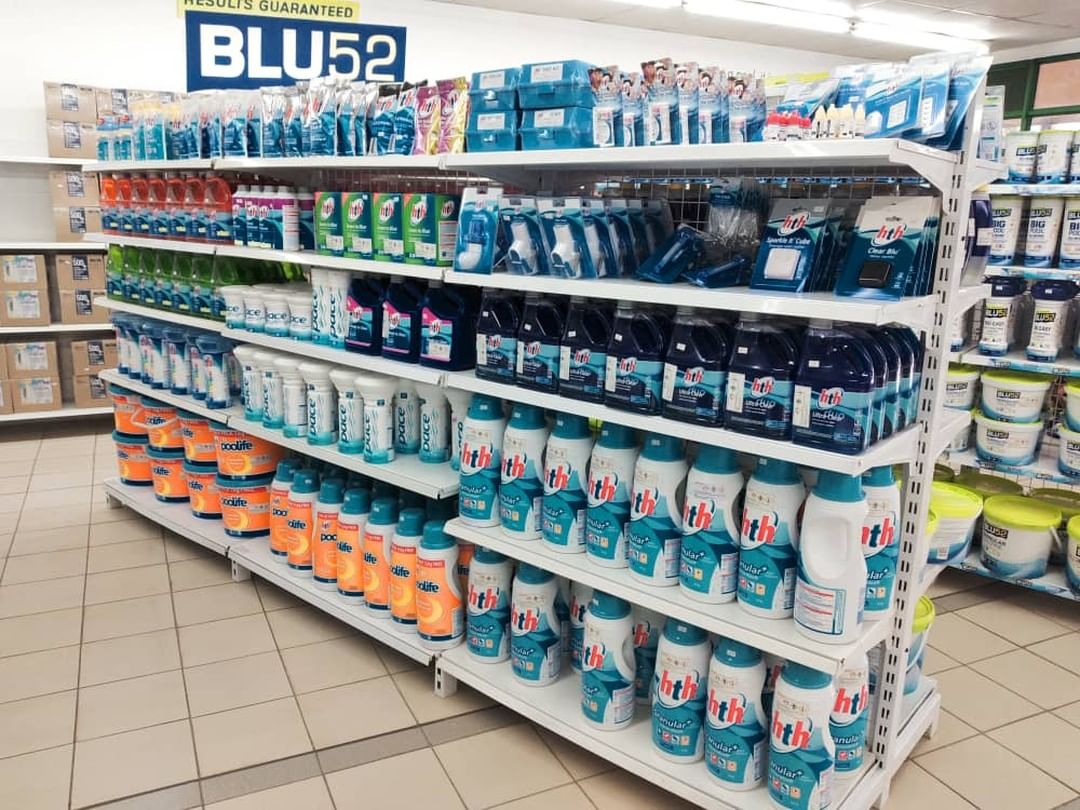
Chlorinated pool systems rely entirely on greater amounts of chlorine for pool water cleaning. It therefore requires that you add chlorine manually to the water.
Although a chlorine system has very little upfront cost compared to a saltwater system, it requires more maintenance. You should regularly test once or twice a week to measure pH and alkalinity levels.
And you should always maintain the right chemical balance in your water. Therefore you need to add chlorine and other chemicals regularly.
Chlorine systems also require significantly less upfront costs than saltwater systems, which rely on complex chlorine generators. In addition, chlorine does not cause major damage to the pool because it does not cause corrosion.
Can You Make a Heated Saltwater Pool

Maybe from the start you asked yourself can you have a heated saltwater pool? of course you can. Because your saltwater pool can definitely be heated like a fresh water pool.
Although the saltwater pool has a chlorine generator, it does not affect the heating unit. So you don’t have to worry, how to install a heater in your swimming pool will be the same as in a chlorine pool.
And because the chemical process is not too harsh and does not produce chloramine, many people are starting to like saltwater pools. Because they realized that chloramine can irritate the eyes and skin in the long run.
Heating Options of Saltwater Pool
Saltwater pools have the exact same heating options as chlorine pools. This means that any method that works for a chlorine or bromine pool will also work for your saltwater pool.
Although each heating option has pros and cons that you should study beforehand. However they are attached to the pool system in exactly the same way and there is no difference at all.
We always advise you to determine the best option to suit your needs before buying it. If you’re unsure or having trouble deciding, ask a pool shop professional for advice.
Here are some of the main heating options you can use for your saltwater pool. We compiled these recommendations through several sites discussing heated saltwater swimming pools.
If you feel you haven’t found what you expect, look for it in a search engine with these keywords. Here are a selection of saltwater pool heaters for you to choose from:
Solar Heater
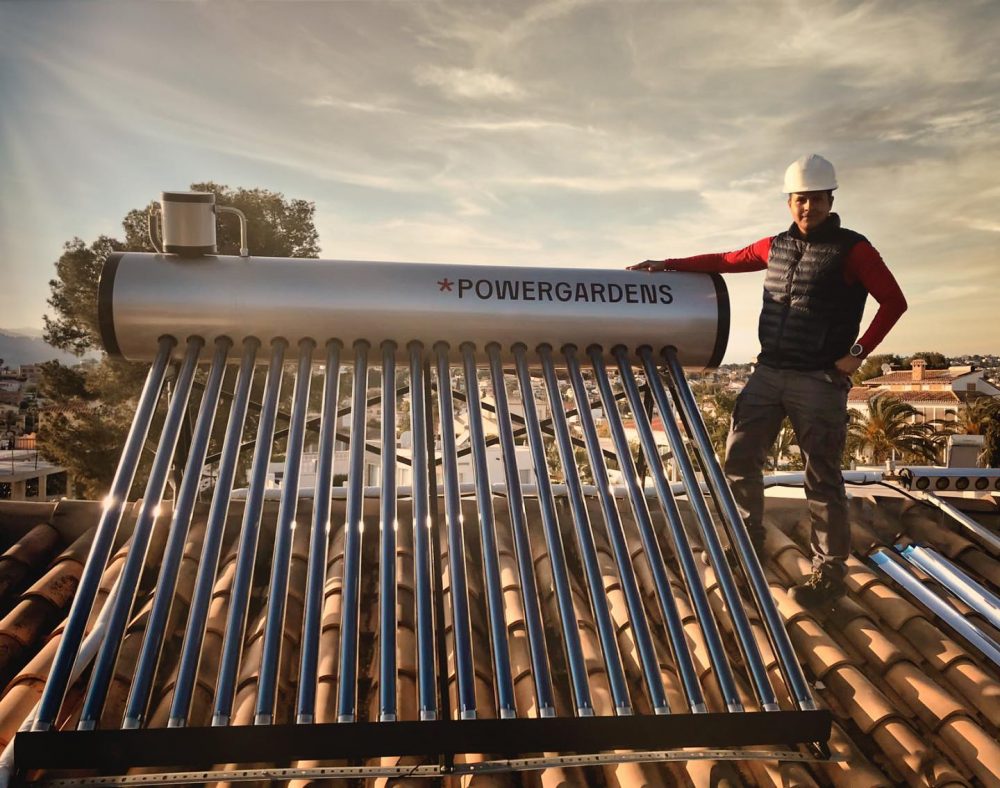
Everyone would agree that solar heating is a good choice because of its low cost and environmental friendliness. Solar panels use solar energy to heat water.
Solar heaters have several parts which generally consist of piping and solar panels. Pool water is pumped through pipes to the solar panels to be heated before returning it to the pool.
To carry out this process, solar panels are usually installed on the roof of the house. And of course you need to install pipes running up and down the house to provide water flow to the roof.
Solar heating only works when there is sufficient solar energy. And you also need a pump strong enough to push water vertically up your roof.
This means that this option will not be efficient if you live in an area that does not get a lot of sun throughout the year. You also can’t heat the pool when it’s dark like you can with a gas heater.
Overall, solar heating is a great option but many people find the cost of solar heating quite expensive. Others consider the plumbing equipment and solar panels an eyesore when seen above the house.
To own a solar heating system you may need an upfront cost of around $4,000 to $5000. The fee is for the purchase of the device and installation by a professional.
Heat Pump
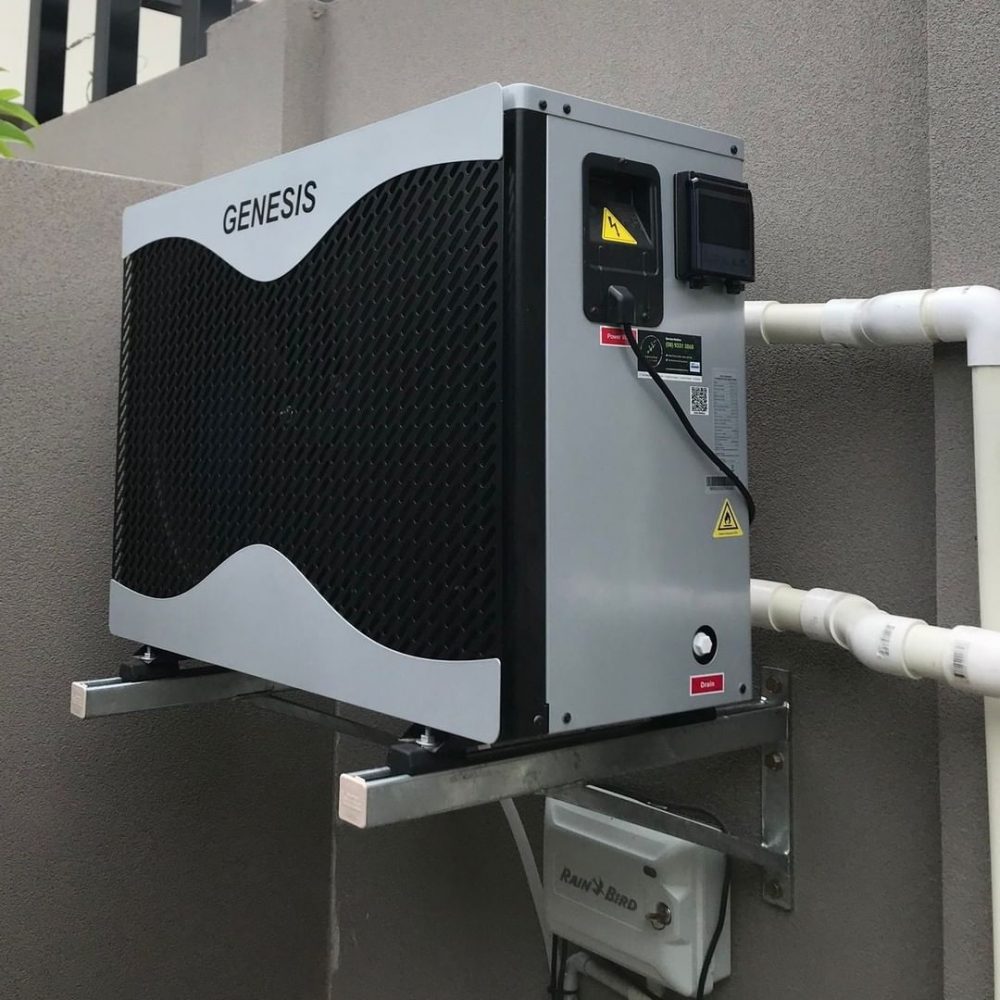
Heat pump are a newer form of pool heating that tends to work well in warmer climates. This is one of the most popular systems recently.
The heat pump works by using a heat compressor to transfer heat from the condenser to the cold pool water to heat it. So this system requires access to an electrical connection to run.
Because of how it works, this system is almost the same as a solar heating system. Both rely on warm/hot weather so they can’t always provide heating on demand.
The heating pump system requires warm air from outside the pool to be pumped into the pool water through the condenser.
The heat pump is usually attached to the pool filter, to be able to transfer heat quickly.
Although the upfront cost is lower than that of a solar heater, the cost of a pump heater is still higher than that of a gas heater. But pump heaters are still more environmentally friendly than gas heaters and have lower ongoing costs.
The upfront cost of owning a heat pump system is $2,000 to $5,000. It costs to buy and install the system, creating the perfect heated saltwater pool.
Gas or Propane Heater

The final method for creating a heated saltwater pool is to use a gas heater. This method is the most efficient method of the two methods above.
To perform this method you must attach a pool heater to your home’s gas pipe. And you can use a propane tank to refuel the pump.
The heater will warm the pool water by burning natural gas or propane and passing the heat through the coils like an electric heat pump. This method allows you to heat the pool overnight.
You also don’t need sunlight to power the system. Which means you can keep your saltwater pool warm all year round.
The upfront cost of owning a gas heater is much cheaper than solar heating or heat pump options, around $1200 to $4000. But heaters require fuel to run and you may pay around $300 to $500 a month to keep the heater running.
Benefits of Saltwater Pools

Having a heated saltwater pool is the dream of many people. If you are one of them, of course, you already know the benefits that you can get.
However, if you are new to heated saltwater pools through this article, then you need to know the benefits. Here is a brief description of the benefits you get when you own or just swim in a saltwater pool.
- Low-Cost Maintenance – The average annual cost to maintain a saltwater pool is only about $70 to $100 per year. You will need to purchase chlorine and balancing materials to maintain the pool.
- Simple Maintenance – Saltwater pool maintenance requires less work to keep it clean compared to its chlorine counterpart.
- Gentler on Eyes, Skin, and Hair – High chlorine levels are often associated with skin, respiratory, and visual problems. While saltwater pools do not contain the toxic fumes of chlorine chemicals, they tend to be gentler on skin and breathing.
- Best for Return on Investment (ROI) – Its higher start-up costs, low running costs and minimal health concerns will make it attractive to future buyers. Swimming pools are considered a luxury and you can expect a fairly high ROI when selling your home.
- Minimal Risk of Storing Chemicals – Storing concentrated chemicals in the home can pose a hazard to people and the surrounding environment. And with salt water users don’t have to worry about storing bottles or buckets of harmful chemicals including chlorine, bromine and more.
Saltwater Pools for Health
In some conditions, swimming in a saltwater pool may be better especially for someone who has asthma or allergies. Because if you come to the indoor pool you may smell a strong chlorine smell.
The smell is due to chloramine, a mixture of chlorine and ammonia which is usually very strong smelling around the surface of the pool. If you have asthma or have trouble breathing, swimming in a chlorinated indoor pool can be especially irritating.
However, this problem may not occur if the swimming pool is outdoors. The smell of chloramine from chlorinated pool water will quickly evaporate in the outdoor air.
One 2003 study found that young children who frequently swam in chlorinated pools had a greater risk for pneumonia and developing asthma. But to draw conclusions there should be further research to determine if saltwater pools are the best alternative.
Heated Saltwater Pool Maintenance
One fact you should know is that saltwater pools are actually not salty and very different from seawater. The salt content in the ocean is at 35,000 parts per million while the saltwater pool is only 2,500 parts per million.
This fact means you can barely detect salt in a saltwater pool. And a saltwater pool will never turn your pool water into salty “beach water.”
So what makes heated saltwater pools popular these days? The best reason is because it can be a viable alternative to traditional chlorinated pools.
Saltwater pools do not require the addition of chlorine directly and regularly. And when your saltwater pool is heated, you can even extend the pool season and enjoy it year round.
To maintain the condition of a heated saltwater pool that is always ready for you to enjoy, you need to take care. Here are some maintenance steps for your heated saltwater pool:
Clean Your Pool
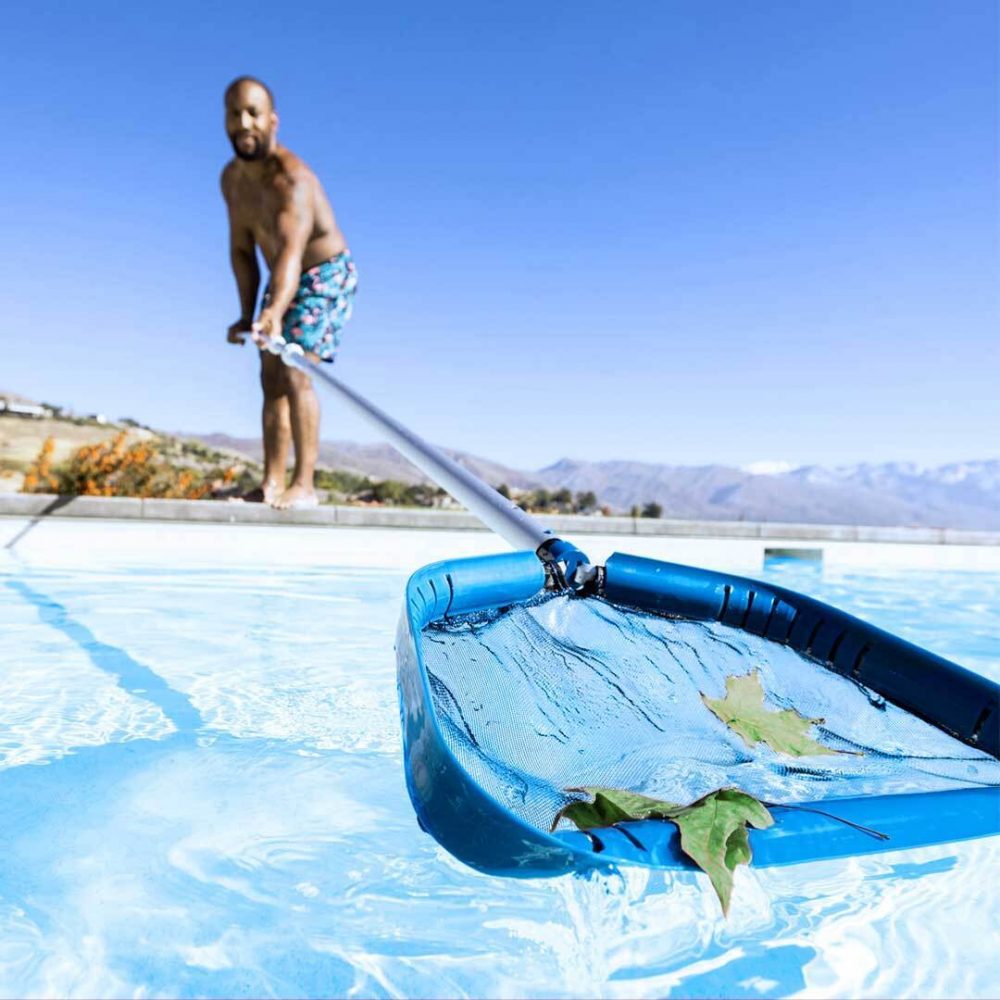
Cleaning your pool is the most important basic maintenance step in maintaining your saltwater pool. Normally you should clean your swimming pool 2 to 3 times a week.
Remove dirt on the surface of your pool with a skimmer or pool vacuum. You may also need to brush the bottom of your pool to keep the salt water from building up and causing staining.
Control Your pH and Chlorine Level
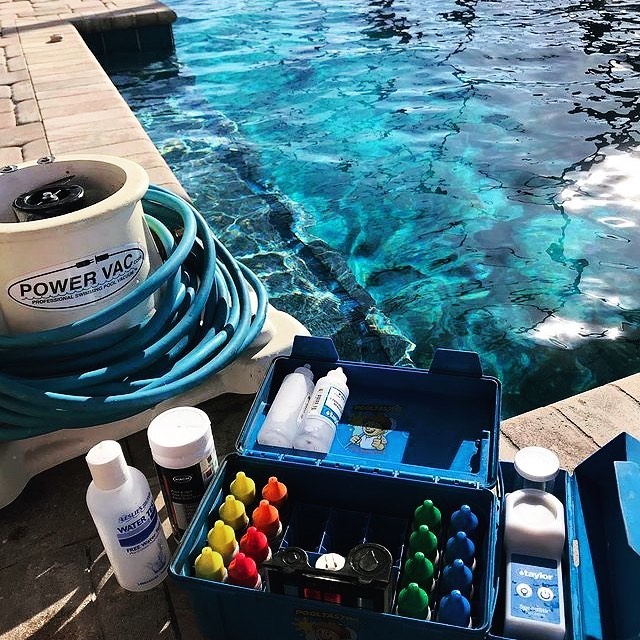
Controlling and checking your pH and chlorine levels weekly should be on your saltwater pool maintenance checklist. To do this you can use a pool test kit.
Keep your pool’s pH level between 7.2 to 7.6 ppm. If it’s higher, you can add sodium carbonate/muriatic acid and if it’s lower, add baking soda.
Your saltwater pool Chlorine level should stay around 1 to 3 ppm. If you live in a warmer climate, sunlight can evaporate more chlorine from your pool.
So you need to test the chlorine stabilizer level in your pool. And you should keep it between 70 and 80 ppm.
Check Pump and Filter

In order for a saltwater swimming pool system to work properly you have to make sure the water pump and filter are functioning properly. This will also make it easier for you when doing your pool maintenance.
Check and clean your pump, filter and generator regularly. And make sure they are all in good working condition, clear of clogging by dirt over time.
When your pool water level becomes low, this can be an indicator of a blockage. Usually the blockage comes from salt buildup in the chlorine generator.
Clean your pool generator by spraying water from a hose to unblock it. You can do this every few months to prevent scale and salt buildup.
Shock Solution or Chlorination
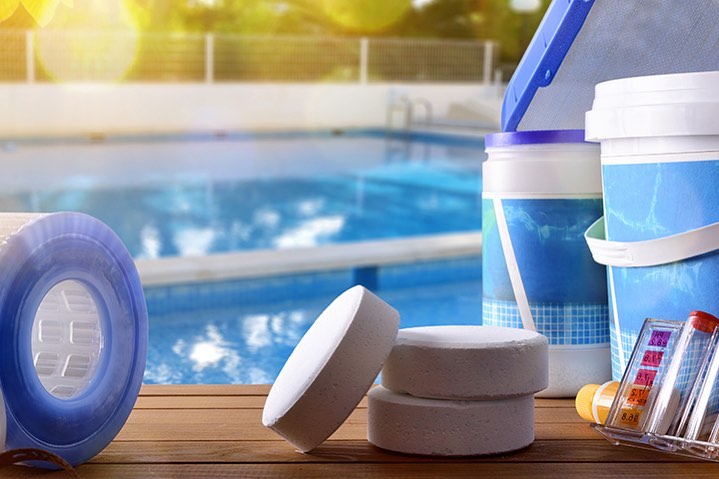
Shocking the pool is sometimes necessary to clean it in depth. Surprise your pool regularly especially before you start using the pool more.
Usually you need to do it in early summer, that is the best time. The chlorination process is proven to be successful in making the water in your saltwater pool look fresh.
